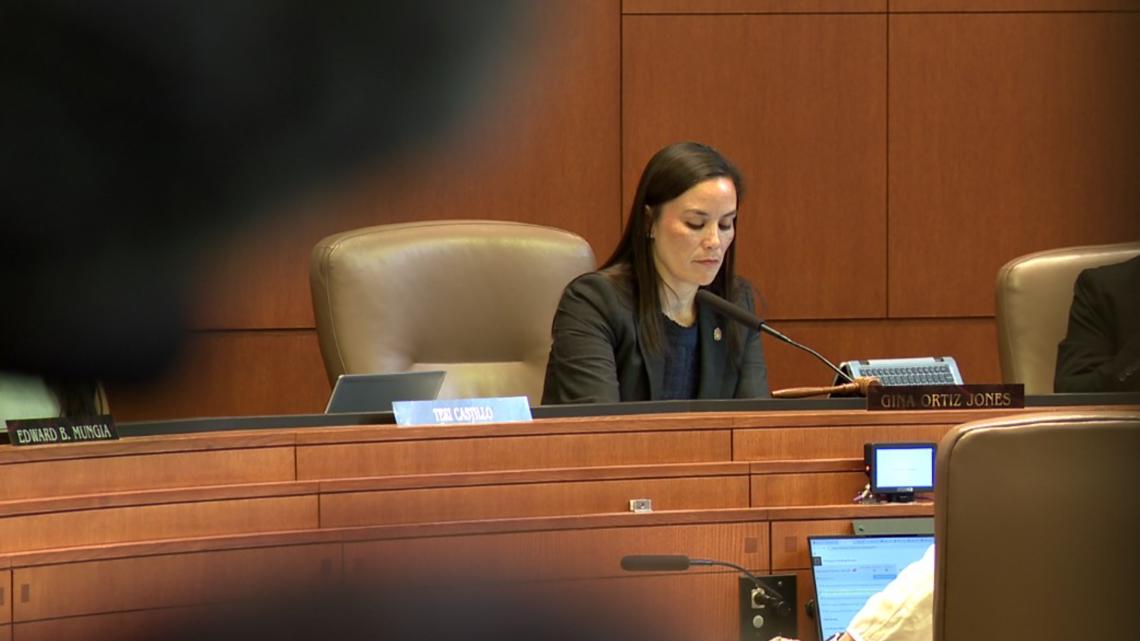
City staff on Wednesday night pulled an agenda item that council members say would have improved safety in San Antonio. Now it’s set to be discussed on Sept. 11.
SAN ANTONIO — Three San Antonio City Council members are responding to Mayor Gina Ortiz Jones’ decision to pull an item from consideration on this week’s meeting agenda, a tactic that effectively prevented council from voting on a new ordinance that would have implemented fines for those who dump dogs and other animals.
A spokesperson for the mayor said the item was pulled because it stemmed from a policy proposal – formally called Council Consideration Requests, or CCRs – submitted before the new council was inaugurated in June. Jones’ office also said all CCRs filed before her administration must be refiled, potentially erasing months of work undertaken to get them to where they are now.
Calling it an “attempt to obstruct our legislative process,” three senior council members – District 5’s Teri Castillo, District 7’s Marina Alderete Gavito and District 10’s Marc Whyte – on Friday submitted a three-signature memo to the City Clerk that forces the item on abandonment punishments to be placed on the Sept. 11 meeting agenda.
The drafted ordinance, Whyte says, is a no-brainer for city leaders.
“My take is that this would have been passed, perhaps, unanimously,” he said. “We’ve been working on it for eight months to a year. For the mayor to try to halt this for really bogus reasons is really unfortunate.”
It was Alderete Gavito who filed a 2024 CCR seeking to protect peacocks, or peafowl, that spurred the drafted ordinance for animal abandonment penalties. According to a City Hall source, her office was told Wednesday evening the agenda item was being removed at the mayor’s request because that CCR was filed before she took office.
A spokesperson for the mayor’s office referred to it as an “expired CCR” that hadn’t yet been discussed in the Governance Committee, typically the first stop for CCRs after they’re submitted to the City Clerk. Yet, according to the city’s public CCR database, it was reviewed by Governance in April 2024 – well over a year before Jones was elected – before advancing to other committees.
“Leadership may change, but the needs of San Antonio families do not,” Alderete Gavito said in a statement Thursday. “Government should move swiftly to deliver results on the issues that matter most to our neighborhoods.”
In a new statement responding to the three-signature memo, Jones commended council for continuing to advocate for the measure before adding “it is still important to remember that we are a new council and there are several members who did not have an opportunity to review the ordinance.”
“Following the CCR process, all items must be reviewed by the new governance committee and this ordinance did not go through the new committee,” the mayor went on to say. “These council members are skipping an important step in the legislative process. I believe that our new council has the responsibility to review proposals that did not complete the legislative process in the previous session.”
The item looking to enact fines for those who abandon animals was placed on the Sept. 11 meeting agenda Friday afternoon.
From protecting peafowl to puppies
Alderete Gavito’s original CCR, filed in March 2024, sought to declare San Antonio a bird sanctuary “to protect wild bird populations within city limits,” in turn making the killing, trapping or relocation of wild birds a punishable offense.
Discussions stemming from that CCR evolved as it went through the committee process. They also came to involve input from San Antonio Animal Care Services (ACS).
And on April 15, 2025, ACS staff shared a plan not only to safeguard the city’s birds but also to update San Antonio City Code so that those who abandon any animal – birds, dogs, livestock or otherwise – are made subject to a fine.
Anyone found to have committed animal abandonment in the Alamo City would be slapped with a fine ranging from $500 to $2,000 for a first offense; $1,000 to $2,000 for a second offense; and $2,000 for any violation thereafter.
Prior policymaking battles
Whyte, Alderete Gavito and Castillo also joined forces to force an August meeting of council after Jones said she was implementing changes to the CCR submission process. Those changes sought to add checkboxes for council members, including requiring that the city manager and city attorney sign off on the drafted policy requests before submission.
Whyte and others said any changes deserved a public conversation and vote on the issue. Jones relented; a day after that Aug. 13 debate, she said she would pull back on her desired changes while teasing a thorough review of the process in 2026.
The process is largely laid out in an ordinance Whyte spearheaded in 2024, under then-Mayor Ron Nirenberg. He pushed back against the mayor’s notion of “expired” CCRs.
“There is no such thing,” he said. “She cannot change the way CCRs are handled simply because she wants to.”
This is a developing story.
